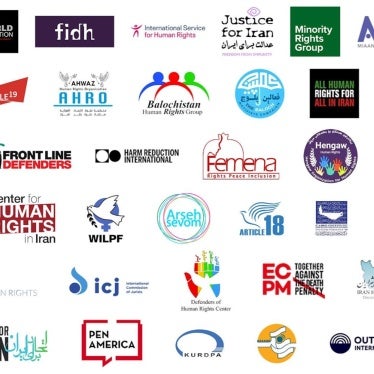Mr. Abdelaziz Bouteflika
President of the Republic
El-Mouradia
Algeria
Dear President Bouteflika,
With elections to the United Nations Human Rights Council quickly approaching, and with Algeria standing as a candidate, we are writing to urge your government to take concrete, visible steps aimed to meet its obligation to “uphold the highest standards in the promotion and protection of human rights,” as set forth in UN General Assembly Resolution 60/251. In advance of the November 12 elections, we urge Algeria to signal its willingness to address ongoing human rights concerns, including by allowing independent unions to operate freely without repression of their freedom of assembly, by releasing people imprisoned for exercising their right to free speech, and by cooperating with the Human Rights Council.
Allow Workers to Form Unions, Meet, and Demonstrate
Algerian authorities over the past year have clamped down on workers’ efforts to form independent unions and organize and participate in peaceful protests and work strikes. Authorities have blocked demonstrations, arbitrarily arrested trade unionists, and prosecuted some on criminal charges, when the real motive behind their prosecution appears to have been punishment for union activities.
Algerian authorities engage in administrative maneuvers to withhold legal status from independent unions. The law on legalizing new unions requires these groups only to notify the authorities that they exist, not to seek their permission to form. But authorities sometimes refuse to issue a receipt proving they have been notified.
Algerian authorities should end their crackdown on independent unions by allowing them to exercise their right to demonstrate and meet freely, without resorting to violence to disperse them. They should also, without further delay, issue receipts to unions that have notified the authorities of their constitution, demonstrating their compliance with the law.
Release Abdelghani Aloui and Others Detained for Exercising Right to Free Speech
Algeria should also demonstrate its readiness to uphold human rights by releasing people serving time in prison for freedom of speech offenses.
In January 2012, Algerian authorities adopted a new information law, which eliminated prison sentences but raised the fines for speech offenses by journalists.Despite the new law, other offenses that criminalize the peaceful expression of political or other opinion pervade the Algerian penal code. The code provides for up to three years in prison for tracts, bulletins, or flyers that “may harm the national interest,” and up to one year for defaming or insulting the president of the republic, the parliament, the army, or state institutions.
Under such laws, blogger Abdelghani Aloui has been detained since September 15, 2013 after he criticized the president’s potential candidacy in the upcoming elections and shared photos and caricatures of the president on his Facebook page. The investigative judge charged Aloui with “insulting state institutions” under article 146 of the Algerian code of criminal procedures, and with “glorification of terrorism,” under article 87bis4 of the same code.
Algerian authorities should release Abdelghani Aloui and drop charges against him related to speech offenses, as they should with any others detained for crimes of speech protected by the right to free expression.
Cooperate with the Human Rights Council
UN General Assembly Resolution 60/251 also calls for all members of the Human Rights Council to fully cooperate with the council, including with its special procedures. Earlier this week, more than 40 civil society groups wrote to you and all other UN member states emphasizing the importance of this commitment, and their expectations for states seeking elections to the Council.
Algeria has the following outstanding visit requests by special procedures:
- Special rapporteur on racism (requested on June 27, 2012)
- Working Group on Enforced or Involuntary Disappearances (requested in 2000, reminders in 2006, 2007, 2008, 2009, 2010, 2011 and 2012)
- Special rapporteur on human rights and counter terrorism (requested in 2006, reminders in 2010 and 2012)
- Independent expert on foreign debt (requested on May 25, 2011 and June 7, 2012)
- Special rapporteur on freedom of peaceful assembly and of association (requested in December 2011)
- Independent expert on cultural rights (requested in June 2010)
- Working Group on Arbitrary Detention (requested in 2009)
- Special rapporteur on torture (requested in 1997 and 2007)
- Special rapporteur on extrajudicial, summary, or arbitrary executions
Algeria should immediately agree to these visits and schedule them for as soon as possible.
Algeria should also issue a standing invitation to all special procedures mandate-holders and accept key recommendations countries made during the interactive debate of the 13th cycle of the Universal Periodic Review on May 29, 2012, including those addressing enforced disappearances, freedom of religion, freedom of expression, assembly, and reunion, and commit to swiftly implement them.
The government should take steps to address the broad range of other endemic human rights issues, including ending impunity for the crimes committed during the Algerian civil war in the 1990s, revising the laws on associations, which unduly restrict freedom of associations, and ending judicial harassment against activists and union leaders.
The election of the Human Rights Council provides an important moment for Algeria to demonstrate an enhanced commitment to addressing human rights concerns, and we appreciate your consideration of those mentioned in this letter.
Sincerely,
Hossam Bahgat
Executive Director
Egyptian Initiative for Personal Rights
Maja Daruwala
Director
Commonwealth Human Rights Initiative
Philip Lynch
Director
International Service for Human Rights
Hassan Shire Sheikh
Executive Director
East and Horn of Africa Human Rights Defenders Project
Ziad Abdel Tawab
Deputy Director
Cairo Institute for Human Rights Studies
Sarah Leah Whitson
Executive Director
Middle East and North Africa division
Human Rights Watch





